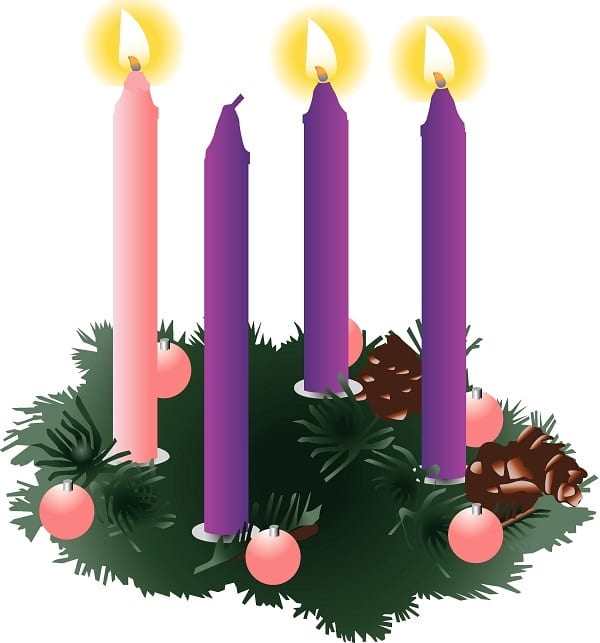
The candle of the Third Sunday of Advent, also called Gaudete Sunday, symbolizes JOY. The third candle is called the Shepherd’s Candle. At the birth of Christ the Lord, an angel appeared to the shepherds and said: “Do not be afraid; for behold, I proclaim to you good news of great joy that will be for all the people. For today in the city of David a savior has been born for you who is Messiah and Lord. And this will be a sign for you: you will find an infant wrapped in swaddling clothes and lying in a manger.” (Luke 2:10-12) Their hearts filled with great joy and expectation, the shepherds went in haste to Bethlehem and found Mary and Joseph, and the infant lying in the manger. With Christmas fast approaching, the hearts of Christians are also filled with joy and expectation for the birth of Christ our Lord.
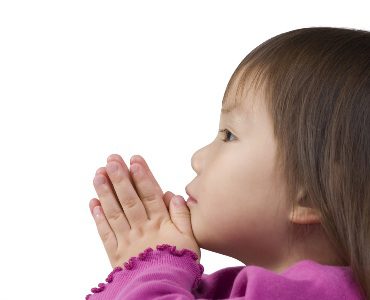
Prayer for the Third Week of Advent
O Lord, we beg Thee to incline Thy ear to our prayers and enlighten the darkness of our minds by the grace of Thy visitation. Through Christ our Lord. Amen.
Turn away from sin!
The crowds asked John the Baptist, “What then should we do?” He said to them in reply, “Whoever has two tunics should share with the person who has none. And whoever has food should do likewise.” Even tax collectors came to be baptized and they said to him, “Teacher, what should we do?” He answered them, “Stop collecting more than what is prescribed.” Soldiers also asked him, “And what is it that we should do?” He told them, “Do not practice extortion, do not falsely accuse anyone, and be satisfied with your wages.” (Luke 3:10-14)
Basically, John was telling people to turn away from their sinful way of life. He told the tax collectors to stop collecting more than what is required, and the soldiers to be satisfied with their pay and to stop extortion. As an analogy in today’s world, John the Baptist will be telling people to turn away from their sinful way of life, especially those in public service who use their position to enrich themselves rather than serve the people. John also told people to be charitable to those who are in need; to share what they have with those who have none. That is timeless advice to all peoples regardless of race and social standing; sharing what you have with those who have none is a universal act of charity.
The people were filled with expectation, and all were asking in their hearts whether John might be the Messiah. John answered them all, saying “I am baptizing you with water, but one mightier than I is coming. I am not worthy to loosen the thongs of his sandals. He will baptize you with the holy Spirit and fire. His winnowing fan is in his hand to clear his threshing floor and to gather the wheat into his barn, but the chaff he will burn with unquenchable fire.” (Luke 3:15-17)
At the time of John’s preaching, there was a general expectation among the Jews that the Messiah’s coming was at hand. They wondered if he was the Messiah. But not only did John humbly deny that he was the Messiah, he also foretold two things about Him:
First, that He would baptize too, but His baptism would be a baptism with the Holy Spirit. John’s baptism of repentance could only rouse the people’s attention to repent, but the Messiah’s baptism will wash people of their sins; they will be sanctified and they will be justified in the name of the Lord Jesus Christ. (cf. 1 Cor 6:11) The Messiah’s baptism will give men the gift of the Holy Spirit and a rebirth to new life.
Second, the coming of the Messiah will result in the separation of two kinds of people. John used the analogy of a winnowing fan, which is a fork-like shovel, with which the threshed wheat was thrown into the air; the wheat kernels fell to the ground and the light chaff was blown off by the wind. The winnowing fan represents the words of the Messiah, the wheat represents those who will believe in Him, listen to His words and act upon them, and the chaff represents those who will not. The wheat will be gathered into His barn, but the chaff He will burn with unquenchable fire.
Later on, Jesus Himself will preach about this too in the Parable of the Weeds (Matthew 13:24-30); at harvest time, the wheat was gathered into the Master’s barn, while the weeds were gathered, tied up and burned. Harvest time is a metaphor for the time of God’s judgment, the barn represents the Kingdom of God in heaven and the unquenchable fire represents the fires of hell.
With such a frightening conclusion, why is this the Gospel passage for Gaudete Sunday (Third Sunday of Advent), the theme of which is JOY? For someone who looks for happiness in the things of this world, it would be an unsettling message. However, joy will be experienced by those who turn away from sin and believe in Christ, listen to His words and act upon them. They are joyful because they live in Christ and the peace of God that surpasses all understanding guards their hearts and minds in Christ Jesus. (Philippians 4:7)
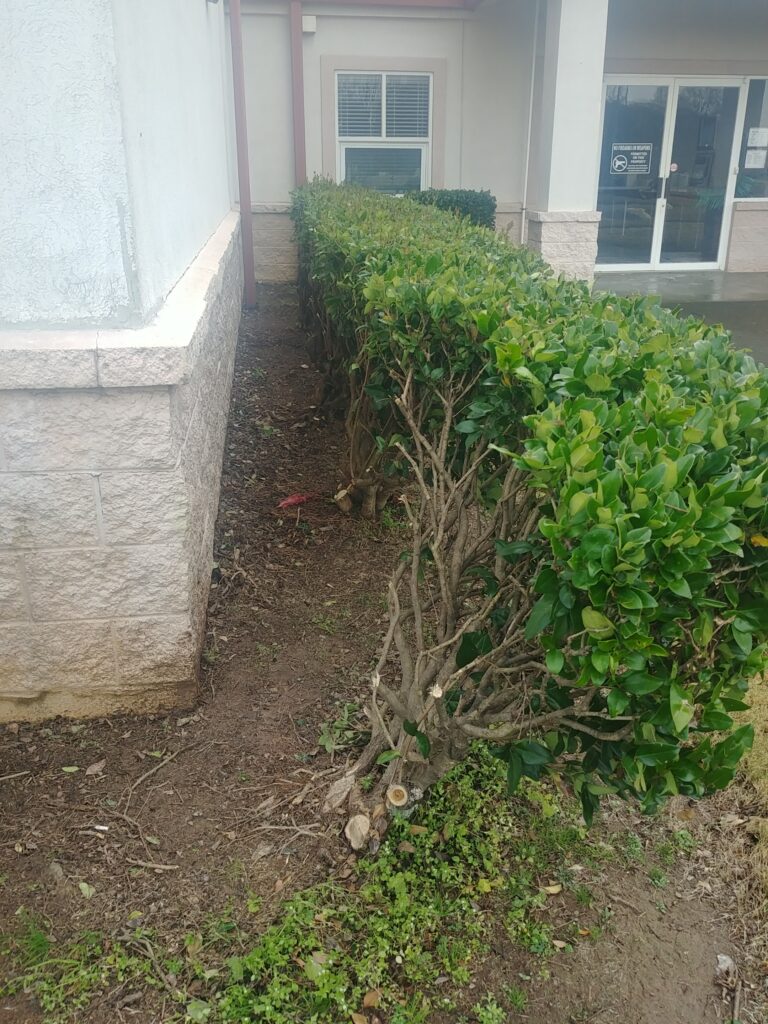
The work to upgrade our drainage system in the front of the Sanctuary building has begun. We expect the whole project to be completed within two weeks.
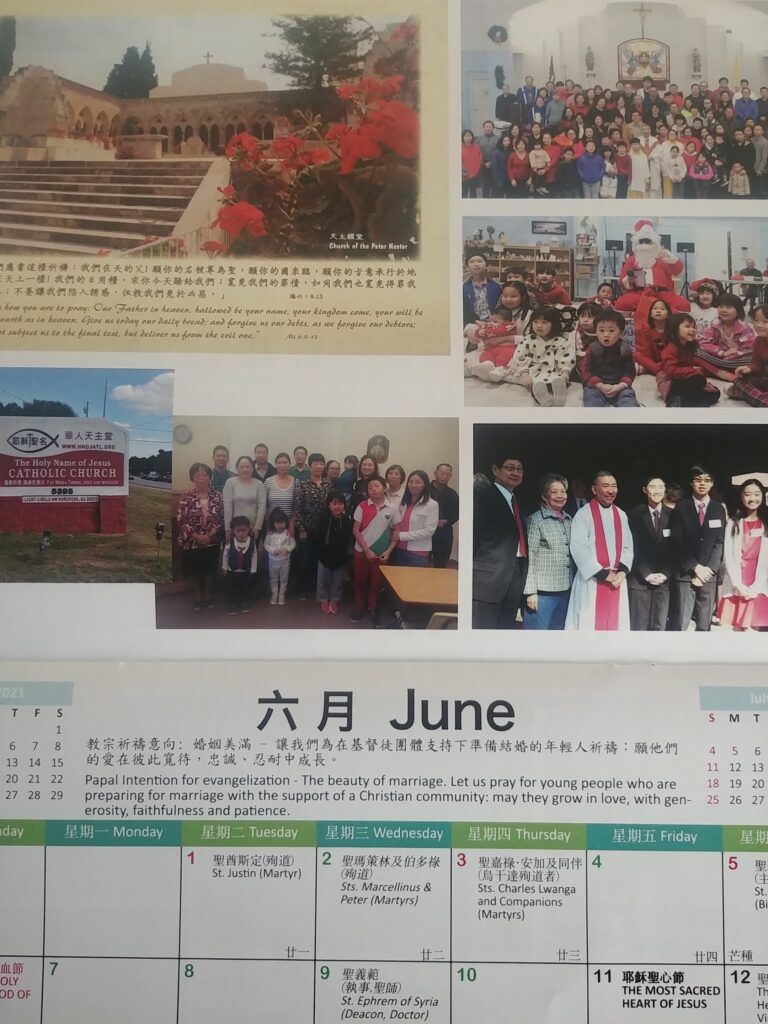
The 2022 Chinese liturgical calendars have been ordered, but our contact person from Our Lady of China Pastoral Mission tells us that due to a supply chain problem, it is possible that there may be a delay in the delivery. We are still hoping that we will get them before the end of this year.
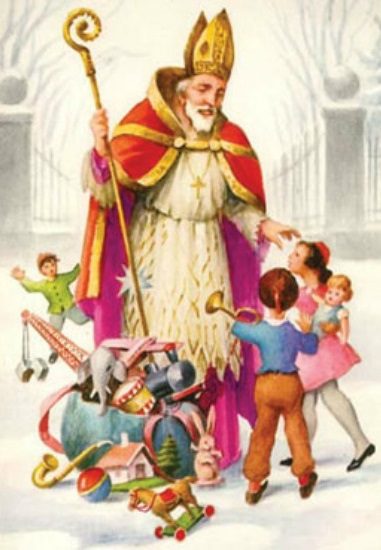
Saint Nicholas (aka Santa Claus) is coming to our church on Christmas Day! Just a reminder to parents and other gift-givers: Please label your gifts and place them under the Christmas Tree, so that Santa Claus can give out the gifts after Mass.